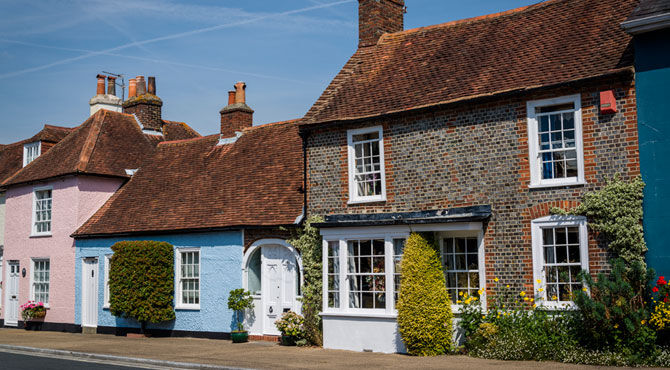UK house market stalls as London prices level off
UK house price growth slumps to its lowest level since 2013. What's caused the drop? Brexit? Impossible-to-maintain house price growth? Relocate Global investigates.

Lenders and surveyors blame Brexit uncertainty
The data reflected the downward trend reported in recent surveys from lenders and surveyors, which some blamed on uncertainty caused by the Brexit vote in last year's referendum but which others suggested was simply one of affordability, with the sharp upward trend in prices seen in recent years impossible to maintain indefinitely.In March, the average UK property value was £216,000, according to ONS figures compiled in conjunction with the Land Registry and other bodies. The figure was 0.6 per cent down on February and represented annual house inflation of 4.1 per cent, down from 5.6 per cent the previous month and the lowest rate since October 2013.The report showed that, while prices in East Anglia and the East Midlands rose by 6.7 per cent, they increased by only 1.5 per cent in London and decreased by 0.4 per cent in NE England.South of England shows softest growth
Richard Snook, senior economist at PwC, commented: “In a reversal of the normal regional pattern, the South of England showed some of the softest growth with price inflation of 2.8 per cent in the South West, 3.8 per cent in the South East and just 1.5 per cent in London. This is the weakest figure for London since March 2012.“These figures are consistent with the Brexit related slowdown that we anticipated last year and our guidance of between two and five per cent growth this year.”Mark Harris, chief executive of SPF Private Clients, added: "The housing market in March was bound to be quieter compared with a year ago because back then investors and second homeowners were rushing to purchase in order to beat the stamp duty hike at the beginning of April. This year there is no such impetus to focus the mind, with the market ticking along as usual."The impending general election is having little impact on the market, apart from the upper end where there may be people just waiting for the sake of three or four weeks before making a decision."Expert says it's unlikely London price growth will recover
Samuel Tombs, chief UK economist, Pantheon Macroeconomics, said: "The slowdown is concentrated in inner London. Looking ahead, it’s very hard to see growth in central London prices recovering, given that valuations look stretched, the financial sector is facing an uncertain post-Brexit future and volatility in sterling is undermining property’s safe-haven appeal for overseas investors."And across the rest of the UK, house price growth looks set to remain dampened by sluggish growth in wages and the loan-to-income limits imposed on lenders by the FPC in 2014. As such, we still expect year-over-year growth in national prices to slow to just two per cent by the end of this year."Related news:
- Surveyors expect housing market to remain flat over summer
- Affordability affecting UK housing market: Nationwide
- Bank of England ups inflation forecast and lowers growth
Andrew McPhillips, Yorkshire Building Society’s chief economist, said: “The headline figure shows house prices have dropped since last month, but if we look at the annual figures, it is clear the average home still costs more than it did at this time last year."The month-on-month decline is yet another indication the market is beginning to stagnate, which supports other recent evidence of lower market activity, such as fewer new buyer enquiries with estate agents. Despite the faltering market, the lack of supply means it is unlikely that prices will fall significantly.“In real terms, with average wage rises continuing to track below inflation, and rising household costs squeezing budgets, buying a home is becoming increasingly less affordable for many people in the UK, particularly those looking to buy their first home. This stall in the market could be prolonged if homeowners put off committing to a move until after the General Election, with this uncertainty potentially causing those looking for properties or thinking of putting their home up for sale to wait.”
London house growth has been unhealthy
Matt Robinson, CEO of Nested, said: “Many people may be fooled into thinking that today’s data shows a housing market suffering from the effects of uncertainty, but I believe that the stable levels of growth are far more conducive to activity."While price growth in the UK housing market has come off the boil somewhat, we continue to see a strong and stable increase in house prices across the country despite the lead up to Brexit and the upcoming general election. The election may result in a momentary market pause, but we expect it to be business as usual thereafter.“The effects of a slowing property market in the capital means that many people have been left in long, slow chains – often unable to move because they or the person they are buying from is stuck in limbo. Crucially, this is the unhealthy part of the market that requires urgent attention - building hundreds of thousands of new homes is essential and these pledges are welcome, but the process of buying and selling in the UK has fundamental flaws that need fixing.”For related news and features, visit our Residential Property section.Access hundreds of global services and suppliers in our Online Directory Get access to our free Global Mobility Toolkit
Get access to our free Global Mobility Toolkit 
©2025 Re:locate magazine, published by Profile Locations, Spray Hill, Hastings Road, Lamberhurst, Kent TN3 8JB. All rights reserved. This publication (or any part thereof) may not be reproduced in any form without the prior written permission of Profile Locations. Profile Locations accepts no liability for the accuracy of the contents or any opinions expressed herein.






































